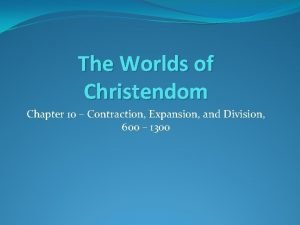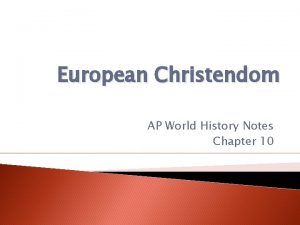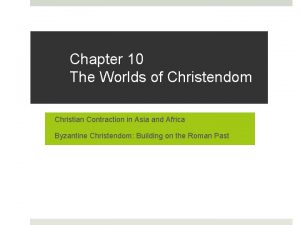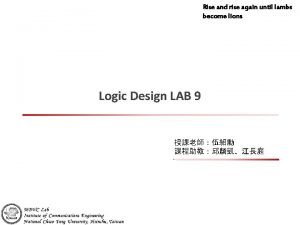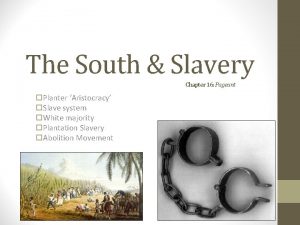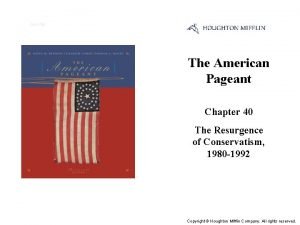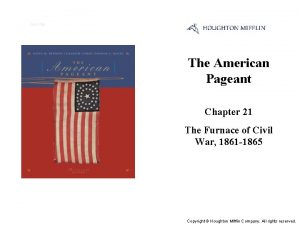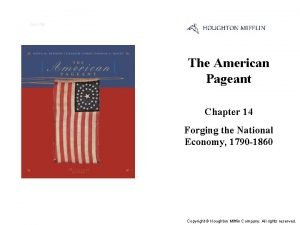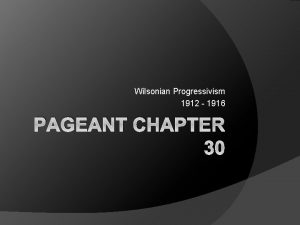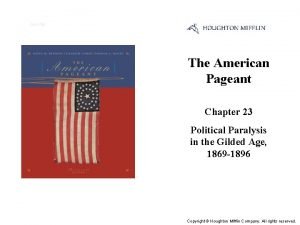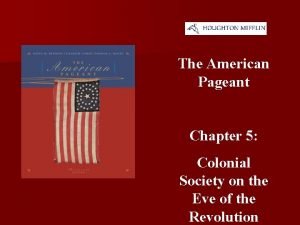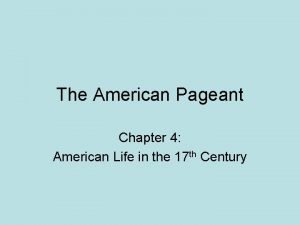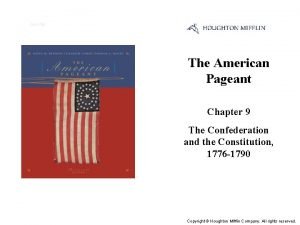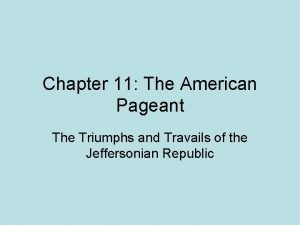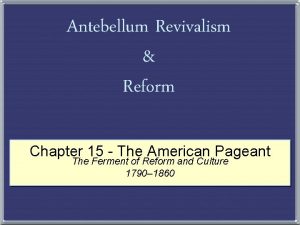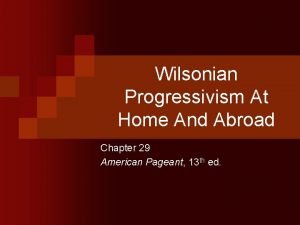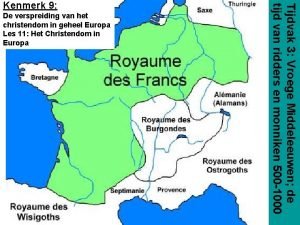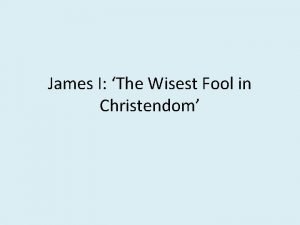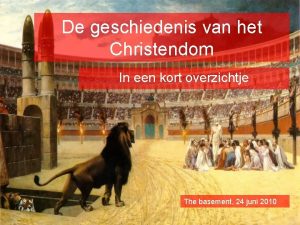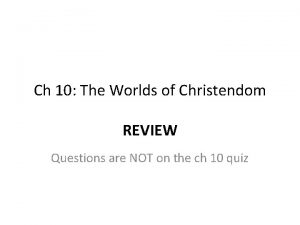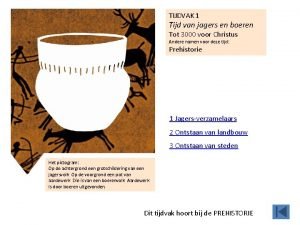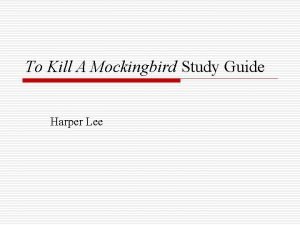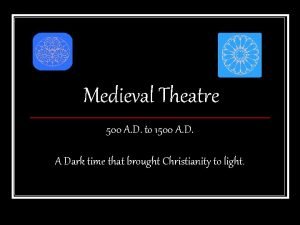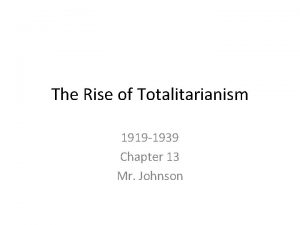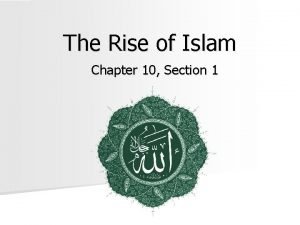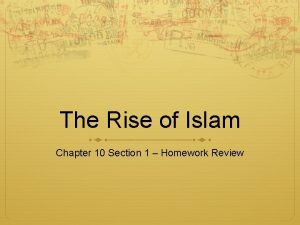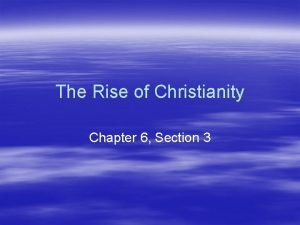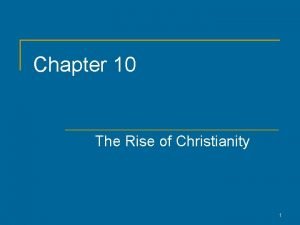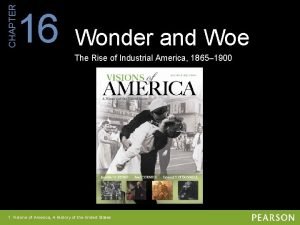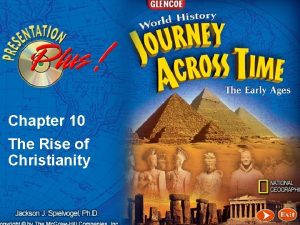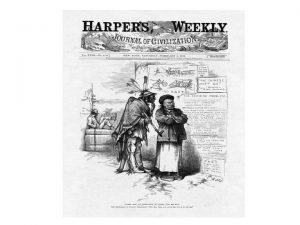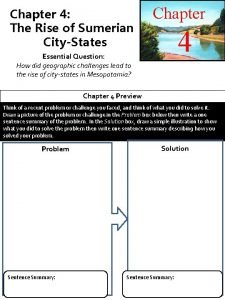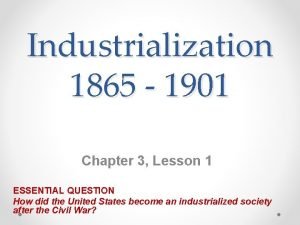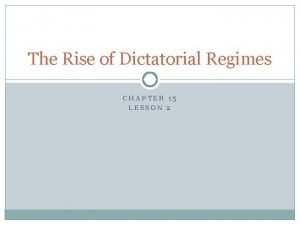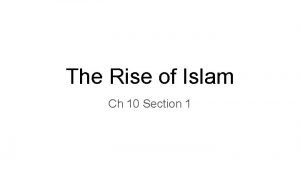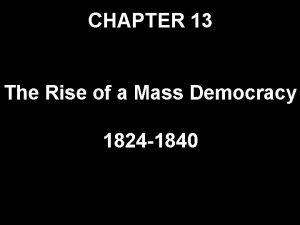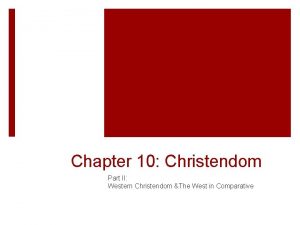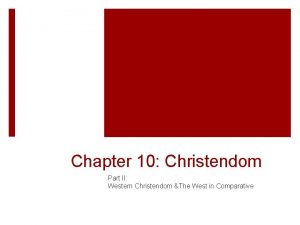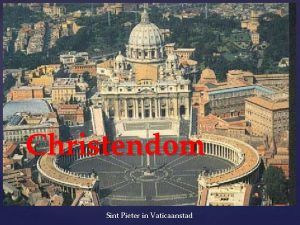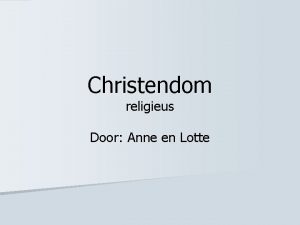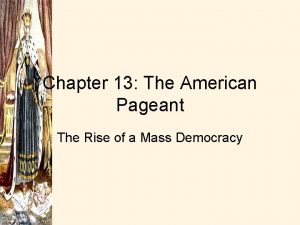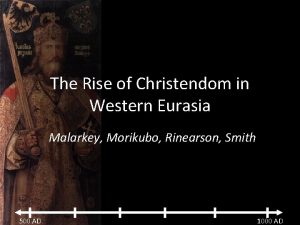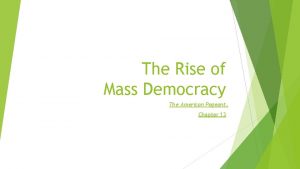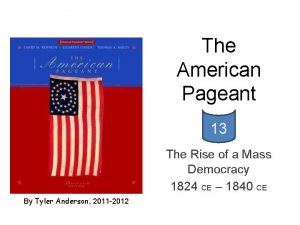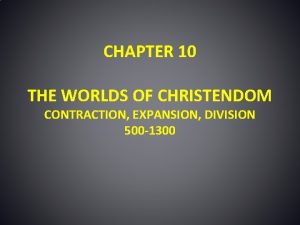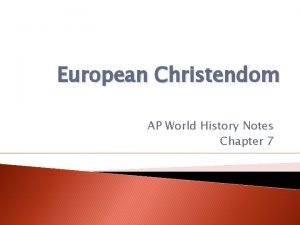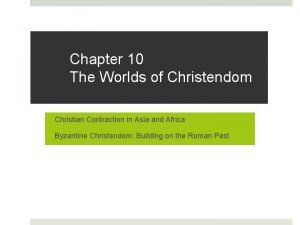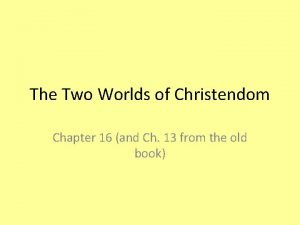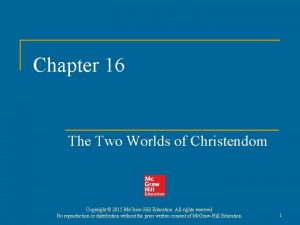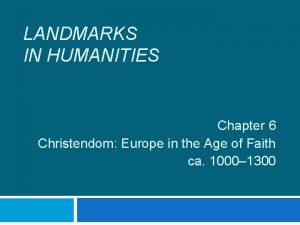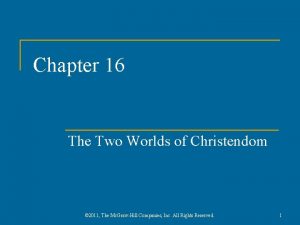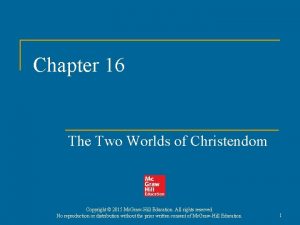Chapter 6 THE RISE OF CHRISTENDOM The Pageant

























































- Slides: 57

Chapter 6 THE RISE OF CHRISTENDOM The Pageant of World History Gerald Leinwand World Cultures

Chapter 6: Section 1 Christianity Began & Grew in Roman Times Essential Questions: 1) How do we know about Jesus’ life? 2) How did Jesus relate his message to others? 3) How did Christianity continue to spread after Jesus’ death? The Pageant of World History Gerald Leinwand World Cultures

The Gospels - Primary Source for Jesus’ life Christendom - the Christian world that arose & grew strong in the decline of Roman power Spread to Europe, northern Africa, & the Middle East Claimed more followers than any other religion Still the world's dominant religion with nearly 2. 2 billion followers. The Pageant of World History Gerald Leinwand World Cultures

The Pageant of World History Gerald Leinwand World Cultures

Jesus’s Life Jesus actually never wrote anything about himself Most of what we know comes from four books in the New Testament called the Gospels, written by his followers after Jesus’ death gospel - “good news” or “good tidings” Four evangelists (preachers) Matthew, Mark, Luke & John The Pageant of World History Gerald Leinwand World Cultures

Jesus and the Gospels Jesus born to Jewish parents, Mary & Joseph in Bethlehem, around 4 B. C. located on eastern coast of Med. Sea in Judea, a Palestinian province Included parts of present day Jordan & Israel The Pageant of World History Gerald Leinwand World Cultures

John the Baptist Jesus was baptized around 30 years old in the Jordon R by his cousin, John the Baptist John was a Jew & was preaching reform & repentance Water was used symbolically as cleansing At same time, John hailed Jesus as the Messiah, or savior, who would free Jews from oppression The Pageant of World History Gerald Leinwand World Cultures

Disciples Christos - Greek word for Messiah From this point, he was called Christ Jesus’ teaching attracted 12 men who became his disciples (follower or believer) • followers traveled w/ him carrying his message & are known as apostles generally means one sent out w/ mission but narrowly, refers to the 12 apostles The Pageant of World History Gerald Leinwand World Cultures

Jesus & the Apostles Carried message throughout Galilee (northern Israel today) & sometimes into Jerusalem - religious center of Judaism Speaking attracted many & his forums were diverse (outside, synagogues, homes) Others found his popularity disturbing • Roman gov’t was supposedly religiously tolerant but required people to worship the emperor as a god • Why is this a problem? The Pageant of World History Gerald Leinwand World Cultures

The Beatitudes The solemn blessings (beatitudines, benedictiones) mark the opening of the Sermon on the Mount, the very first of Our Lord's sermons in the Gospel of St. Matthew (5: 3 -10). Reflects spiritual character of the Messianic kingdom Paramount idea of the Beatitudes The Pageant of World History Gerald Leinwand

The Pageant of World History Gerald Leinwand

One God Jesus taught there was one God - the God of the Jewish tradition When some started to call him the “King of the Jews”, Roman officials became very hostile • assumed loss of influence • assumed Jesus would raise an army to topple Roman Empire The Pageant of World History Gerald Leinwand World Cultures

Last Supper A. D. 30 - Jesus led disciples to Jerusalem for Passover (annual Jewish celebration) After the supper, Judas Iscariot, a follower of Jesus, helped Roman authorities arrest Jesus Stood trial before Pontius Pilate, Roman governor of Judea (under Emperor Tiberius) Pilate left it to the people who demanded punishment Charged him w/ blasphemy - contempt of the gods The Pageant of World History Gerald Leinwand World Cultures

Jesus’ Crucifixion Death by Crucifixion - a common form of punishment slow and painful principally known in antiquity, but remains in occasional use in some countries (Burma, Iran, UAE, Syria, others) Jesus was crucified in 1 st century A. D. The Pageant of World History Gerald Leinwand World Cultures

The Resurrection Gospels also tell that Jesus arose from the dead & left the tomb 40 days later, ascended or rose into heaven Crucifixion increased his following instead of eliminating his influence Confirmed that he was the Messiah The Pageant of World History Gerald Leinwand World Cultures

Jesus Preached a New Message also reflected Jewish tradition: 1. One true God, God of Israel 2. encouraged obedience to Ten Commandments The Pageant of World History Gerald Leinwand World Cultures

Parables Jesus used parables - simple stories to teach moral lessons Disciples spread the Gospel, traveling all over the world to spread His message The Pageant of World History Gerald Leinwand World Cultures

Apostles Spread Jesus’ Message Traveled throughout Palestine & Syria teaching Christian doctrine Of the 11, Peter had the most success • taught for more than 30 years • converted many to Christianity During Nero’s reign, a devastating fire spread throughout Rome • Blamed Peter & other Christians • Sentenced to death A. D. 64 • led to increased persecutions of Christians The Pageant of World History Gerald Leinwand World Cultures

Paul Transformed Christianity Paul of Tarsus became the most effective missionary of the early Church Mid-30 s to the mid-50 s, he founded several churches in Asia Minor and Europe both Jewish & Roman citizen spoke several languages including Greek & Latin The Pageant of World History Gerald Leinwand World Cultures

Paul Transformed Christianity Separated Christianity from Judaism Established structure & organization to the faith • Epistles (letters) became part of New Testament The Pageant of World History Gerald Leinwand World Cultures

Chapter 6: Section 2 Christianity Overcame Roman Persecution Essential Questions: 1) How were the early Christians treated in the Roman Empire before A. D. 313? 2) What role did Constantine play in the history of Christianity? 3) What factors helped Christianity to survive? The Pageant of World History Gerald Leinwand World Cultures

Persecution of Early Christians Neither the Crucifixion of Jesus nor the deaths of Peter and Paul dampened the growth of Christianity in the Roman Empire By AD 300, spread to: • parts of Asia Minor & Greece • eastern shore of the Mediterranean • parts of northern Africa • parts of western Europe The Pageant of World History Gerald Leinwand World Cultures

Persecution of Early Christians did not worship the Roman emperor, so considered enemies of the state AD 64, Emperor Nero - 1 st campaign persecuting Christians • forced to fight wild animals in colosseums • soaked in oil & torched • crucifixions (Peter & Paul) • lasted 250 years in Roman Empire The Pageant of World History Gerald Leinwand World Cultures

Persecution of Early Christians Roman Empire in decline Roman leaders needed to blame Christians for: • political failures • military defeats • Tertullian, Roman convert to Christianity recognized the absurd blame on Christians • “The Christians to the Lion” The Pageant of World History Gerald Leinwand World Cultures

Persecution of Early Christians Marcus Aurelius, one of Rome’s strongest Rulers was also fierce persecutor of Christians Why? The Pageant of World History Gerald Leinwand World Cultures

Persecution of Early Christians Marcus Aurelius believed: • Could not be Christians AND be loyal Roman subjects • Early Christians objected to military service: 1. Refusal to kill-on authority of Ten Commandments and Jesus’ teaching 2. Refusal to comply with Roman military life (Extortions, Violence like scourging, torture, crucifixion, Licentiousness of comrades, emperor worship, and pagan rites) The Pageant of World History Gerald Leinwand World Cultures

Persecution of Early Christians Worst period of persecution under Diocletian (AD 284 - AD 305): • Absolute monarch • Demanded that people worship him as a god 1. Christian services outlawed 2. Clergy imprisoned 3. No Christians in public service 4. Scriptures, Christian writings, & churches burned The Pageant of World History Gerald Leinwand World Cultures

Eventual Toleration & Acceptance Christianity gained from persecution: • Martyrs (people who died for their faith) not seen as revolutionaries or criminals but honored • Gave credence to unshakeable faith • By end of 3 rd c. , 1 in 10 Romans had converted to Christianity The Pageant of World History Gerald Leinwand World Cultures

Eventual Toleration & Acceptance Constantine: • AD 312 - inspired in battle preparation, to call upon the Christian God • Soldiers bore shields & banners bearing the cross • Upon victory, Constantine gave credit to the God of the Christians • Called upon Christians for guidance often after this spiritual experience The Pageant of World History Gerald Leinwand World Cultures

Eventual Toleration & Acceptance Constantine (continued): • continued to worship the pagan sun god • considered himself a Christian • Issued the Edict of Milan in AD 313, which was a turning point: 1. religious tolerance 2. ended persecution by the Roman gov’t 3. Christians could worship freely 4. Constantine baptized in AD 337, before his death The Pageant of World History Gerald Leinwand World Cultures

Eventual Toleration & Acceptance Theodosius ruled from AD 379 - AD 395: • passed a law stating everyone had to be a Christian • AD 380 - Christianity became official religion • unlawful to practice any other religion • This document ended religious tolerance but also… • opened door to religious persecution of non-Christians The Pageant of World History Gerald Leinwand World Cultures

Christianity Had Wide Appeal Factors contributing to the success: 1. Wide appeal - welcomed peasants, members of Roman army, & educated upper classes w/hope of salvation to rich & poor 2. Offered explanations of meaning of life 3. Offered moral guidance in environment of heavy Roman state control over all aspects of life Judaism had been more satisfying but it did not attempt to convert non-Jews The Pageant of World History Gerald Leinwand World Cultures

Christianity Had Wide Appeal Factors contributing to the success (cont. ): 4. Many people unhappy w/ Roman control but also a period of relative peace & communication & exchange of ideas easy well-built & safe roads = easy travel for Christian evangelists 5. Christian message itself was most impt. b/c explained suffering & evil promised relief from hardship & injustice in next life emphasized individual responsibility for moral choice message of universal love & brotherhood The Pageant of World History Gerald Leinwand World Cultures

Chapter 6: Section 3 Christianity Emerged as a Major Force Essential Questions: 1) What role did the Church play after the fall of the Roman Empire? 2) How did monasteries preserve ancient learning? 3) What lasting effects have Judaism & Christianity had on the development of Western culture? The Pageant of World History Gerald Leinwand World Cultures

Church Established a Common Body of Beliefs & Writings By Constantine’s reign, Christians agreed and disagreed on many important matters Points of Agreement: 1. Jesus was the Christ 2. The resurrection Points of Disagreement: 1. What Jesus taught 2. Whether or not Jesus was human 3. Ways of worship The Pageant of World History Gerald Leinwand World Cultures

Church Established a Common Body of Beliefs & Writings Council at Nicaea: • 1 st ecumenical council called by Constantine to come together & debate & answer big religious issues • crucial turning point in history of Church • demonstrated that 1. Church would be an orthodoxy (all must follow official teachings & practices) 2. There would be an organized method to making decision The Pageant of World History Gerald Leinwand World Cultures

Church Established a Common Body of Beliefs & Writings Other impt. ecumenical meetings: 1. Council of Chalcedon A. D. 451 • declared all faithful Christians must accept the teaching that Jesus was both fully human & fully divine at same time The Pageant of World History Gerald Leinwand World Cultures

Church Established a Common Body of Beliefs & Writings Other issues of controversy & response: 1. which writings about Jesus would be accepted? • Jewish Scripture - Old Testament • New Testament: A. 4 Accounts of Jesus’ life in the Gospels B. stories of how apostles spread Jesus’ message C. 21 Epistles written by Paul & others D. Revelation of John The Pageant of World History Gerald Leinwand World Cultures

Church Established a Common Body of Beliefs & Writings Church Fathers: 1. As New. Testament was being organized, this group wrote religious works that explained Christian theology - beliefs about God A. Not part of the New Testament but B. Impt. body of Church writing that carries authority The Pageant of World History Gerald Leinwand World Cultures

Church Established a Common Body of Beliefs & Writings Jerome (AD 340 to AD 420), a Church Father: 1. translated Old & New Testaments into Latin A. Known as the Vulgate - Bible in common use B. Made the Bible more accessible for educated to read Christian message The Pageant of World History Gerald Leinwand World Cultures

Church Established a Common Body of Beliefs & Writings Augustine of Hippo (AD 354 to AD 430), a Church Father: 1. most influential & best known A. wrote many impt. books regarding morality, family life, Church dogma (beliefs authorized by the Church) The Pageant of World History Gerald Leinwand World Cultures

Christian Ways of Worshipping Changed Early Christian worship services were simple initially • recited prayers • read from Christian writings • hymns of praise • Symbolic meal - Last Supper • often gathered in private homes The Pageant of World History Gerald Leinwand World Cultures

Christian Ways of Worshipping Changed Gradually, became more involved regarding place of worship & ritual • impressive churches w/ fine art • Bishops had beautiful robes meant to represent impt parts of worship • Beautifully bound Bibles to demonstrate reverence The Pageant of World History Gerald Leinwand World Cultures

Christian Ways of Worshipping Changed Some Christians also organized themselves to lead lives of prayer, worship, & charity • monks or nuns • spread teachings of Christianity • separated themselves from the world to some degree to keep free from sin • Monasteries - religious communities established throughout Roman Empire The Pageant of World History Gerald Leinwand World Cultures

Christian Ways of Worshipping Changed Benedict - AD 480 - AD 543 • Founded an order (distinct group) • Became known as the Benedictines in Italy • took vows of absolute obedience to abbot (head of monastery) • no property ownership • no travel w/out permission • food & clothing strictly regulated • time spent in study, prayer, & manual labor The Pageant of World History Gerald Leinwand World Cultures

The Church took on the Role of Government Church could be called Catholic (or universal): • unified organization • wide sphere of influence • a hierarchy - organization of officials ranked in order of their power decisions could be made & enforced on all levels Councils of Nicaea & Chalcedon are examples The Pageant of World History Gerald Leinwand World Cultures

The Church took on the Role of Government Church Hierarchy 1. Each impt. city had a bishop or a patriarch to direct affairs of many smaller churches in the area 2. Smaller churches led by prophets or teachers (eventually priests) 3. Archbishops (had headquarters in capital cities of Roman provinces) presided over districts run by bishops The Pageant of World History Gerald Leinwand World Cultures

The Church took on the Role of Government Bishop of Rome held highest authority in the Church: 1. Rome was imperial capital of the Roman Empire 2. Matthew 16: 18 And I say also unto thee, That thou art Peter, and upon this rock I will build my church; and the gates of hell shall not prevail against it. ” 3. Bishop claimed Jesus had picked Rome as foundation of the Church b/c Peter had been martyred in Rome The Pageant of World History Gerald Leinwand World Cultures

The Church took on the Role of Government Bishops in Eastern Roman Empire did not accept this Ropme shared power w/ Constantinople for many years Rome’s bishop still held title of Pope The Pageant of World History Gerald Leinwand World Cultures

The Church took on the Role of Government After the fall of Rome, the Church played major role in maintaining order As emperor lost power, pope claimed political as well as spiritual authority Christian law came to dominate every day life Popes began to rule as divine monarchs all over Christendom Christianity continued to spread even to those who invaded the empire The Pageant of World History Gerald Leinwand World Cultures

Monasteries Preserved Western Culture Religious orders preserved knowledge & scholarship of ancient times after fall of Rome Benedictines Franciscans (Francis of Assisi) • monks & nuns copied classical Greek & Latin texts • would have been lost forever in fall of Rome • preserved philosophy of Aristotle & Plato & history of Roman Empire The Pageant of World History Gerald Leinwand World Cultures

Monasteries Preserved Western Culture Religious orders also helped to spread knowledge 1. established schools usually for children of nobles 2. monks & nuns experimented w/ new farming techniques & medical treatments The Pageant of World History Gerald Leinwand World Cultures

Judeo-Christian Teachings Established Lasting Heritage Judeo-Christian tradition = combined influence of 2 major religions: Judaism & Christianity Teachings have transcended religion • Western Culture • Affected thinking of people who are not Christian, Jewish, or even in the Western world The Pageant of World History Gerald Leinwand World Cultures

Judeo-Christian Teachings Established Lasting Heritage Ideas particular to Judeo-Christian tradition: 1. non-self-interested love or the awareness of others’ individuality each human being has value in him or herself - apart from relationship to a particular community The Pageant of World History Gerald Leinwand World Cultures

Judeo-Christian Teachings Established Lasting Heritage Ideas particular to Judeo-Christian tradition (continued): 2. Free will - Doctrine that God created man & commanded him to obey & promised reward or punishment for observance or violation of this God not only understood with intellect but by our creation We have divine sense of goodness, which allows us to distinguish good from evil sense is limited, is not infallible, and may encounter difficulty The Pageant of World History Gerald Leinwand World Cultures

Judeo-Christian Teachings Established Lasting Heritage Ideas particular to Judeo-Christian tradition (continued): 3. Each individual judged by God according to his or her own actions not those of ancestors The Pageant of World History Gerald Leinwand World Cultures

Judeo-Christian Teachings Established Lasting Heritage Ideas shared btwn Judeo-Christian tradition & other religions: • emphasis on family life & respecting elders • virtues of humility, charity, & honesty The Pageant of World History Gerald Leinwand World Cultures
 Chapter 10 the worlds of christendom notes
Chapter 10 the worlds of christendom notes Chapter 10 ap world history notes
Chapter 10 ap world history notes Chapter 10 the worlds of christendom notes
Chapter 10 the worlds of christendom notes Rise and rise until lambs become lions
Rise and rise until lambs become lions Tricky dick
Tricky dick Rise and rise again until lambs become lions
Rise and rise again until lambs become lions Rise and rise again until lambs become lions origin
Rise and rise again until lambs become lions origin American pageant chapter 16
American pageant chapter 16 American pagent chapter 35
American pagent chapter 35 Chapter 40 american pageant
Chapter 40 american pageant Chapter 21 the american pageant
Chapter 21 the american pageant Chapter 14 american pageant
Chapter 14 american pageant American pageant chapter 13
American pageant chapter 13 American pageant chapter 30
American pageant chapter 30 The best christmas pageant ever chapter 5
The best christmas pageant ever chapter 5 The best christmas pageant ever chapter 1
The best christmas pageant ever chapter 1 Chapter 23 american pageant
Chapter 23 american pageant American pageant chapter 34
American pageant chapter 34 Chapter 5 american pageant
Chapter 5 american pageant American pageant chapter 4
American pageant chapter 4 Chapter 9 american pageant
Chapter 9 american pageant American pageant chapter 11
American pageant chapter 11 American pageant chapter 15
American pageant chapter 15 Chapter 41 american pageant
Chapter 41 american pageant American pageant chapter 29
American pageant chapter 29 De verspreiding van het christendom in geheel europa.
De verspreiding van het christendom in geheel europa. Wisest fool in christendom
Wisest fool in christendom De geschiedenis van het christendom
De geschiedenis van het christendom In comparison to byzantium latin christendom
In comparison to byzantium latin christendom De verspreiding van het christendom in geheel europa
De verspreiding van het christendom in geheel europa Jodendom christendom
Jodendom christendom To kill a mockingbird study guide
To kill a mockingbird study guide The best christmas pageant ever novel study
The best christmas pageant ever novel study What is a pageant wagon
What is a pageant wagon Pageant wagons medieval theatre
Pageant wagons medieval theatre The best christmas pageant ever trailer
The best christmas pageant ever trailer Chapter 13 the rise of totalitarianism
Chapter 13 the rise of totalitarianism Chapter 10 section 1 the rise of islam
Chapter 10 section 1 the rise of islam Chapter 10 section 1 the rise of islam
Chapter 10 section 1 the rise of islam Chapter 6 section 3 the rise of christianity
Chapter 6 section 3 the rise of christianity Chapter 13 the rise of a mass democracy
Chapter 13 the rise of a mass democracy Chapter 10 the rise of christianity
Chapter 10 the rise of christianity The rise of industrial america chapter 16
The rise of industrial america chapter 16 Chapter 10 the rise of christianity
Chapter 10 the rise of christianity Lesson 5 the rise of segregation
Lesson 5 the rise of segregation Chapter 4 the rise of sumerian city-states
Chapter 4 the rise of sumerian city-states Industrialization (1865 to 1901 worksheet answers key)
Industrialization (1865 to 1901 worksheet answers key) Why were italian nationalists outraged after ww1
Why were italian nationalists outraged after ww1 Monotheistic
Monotheistic Chapter 13 the rise of a mass democracy
Chapter 13 the rise of a mass democracy Hình ảnh bộ gõ cơ thể búng tay
Hình ảnh bộ gõ cơ thể búng tay Slidetodoc
Slidetodoc Bổ thể
Bổ thể Tỉ lệ cơ thể trẻ em
Tỉ lệ cơ thể trẻ em Voi kéo gỗ như thế nào
Voi kéo gỗ như thế nào Chụp tư thế worms-breton
Chụp tư thế worms-breton Chúa yêu trần thế
Chúa yêu trần thế Các môn thể thao bắt đầu bằng tiếng đua
Các môn thể thao bắt đầu bằng tiếng đua
